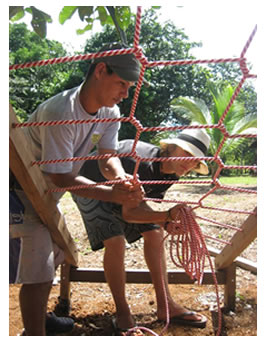
| Home | About us | Volunteer work | Consulting | Travel | Costa Rica |
|
Conservation projects are nowadays focusing on the development of a general conceptual label, its corresponding recommendations and options for a successful implementation of environmental solutions. We want to capacitate communities to develop their own ideas and to take practical steps to improve the beautiful environment they live in. |
||||||||||||||
|
|
||||||||||||||
Nowadays every organization should think about an integrated mechanism that regulates actions of the key business. Ideally, CSR concepts work as a mechanism whereby it monitors and ensures its adherence to law, ethical standards and international norms. Organizations should embrace responsibility for the impact of their activities on the environment, the consumers, the employees and the communities they affect. Furthermore, new and increased business activities should encourage community growth and development, as well as voluntarily eliminating practices that harm the public, regardless of legality.
Essentially, CSR represents the inclusion of the public interests into corporate decision-making, and the honoring of a triple bottom line: People, Planet, Profit! |
|||||||||||||||
Therefore a well planned project should look for the economic and environmental benefit in the long term, the advantage of renewable sources of energy, the use of sustainable materials and low impact, the water saving and the good disposition of solid and liquid remainders. Most of the elements mentioned above therefore have to be considered prior to initiating a project. Our advisory team offers effective solutions of design and monitoring, considering the surroundings and choosing the area of the development of each project and the elements carefully with which the impact on the environment can be kept to a minimum.
|
|||||||||||||||
|
|||||||||||||||
The increasing production of convenience foods generally associated with a commercial chain can bring large health issues as well as social, welfare and environmental aspects. Using chemical products to eliminate plagues can generate major resistance in the plants used and poison the water sources nearby that are needed by thousands of people. Natural habits and traditions are being destroyed rapidly by monoculture. For this reason, the rotation of crops, the use of organic methods and the revitalisation of the ground through sustainable practices is elementary and allows us to have healthy food in the future. Our advisory team offers effective solutions for the improvement of the productive systems taking maximum advantage of the resources and to reduce the negative impact on Mother Nature.
Sources of renewable energy The dependency of human beings on non-renewable resources of energy such as oil, coal and water triggers a series of environmental, social and economic problems due to the great impact that occurs when generated their extraction. The war of the black gold has been one of the examples that have shown serious sequels in the history of the humans. Nevertheless, alternative energies such as the sun or the wind do exist; they generate the same energy and can be used efficiently by everyone on the planet straight away. The design of integral systems where several systems of renewable energy are conjugated, allows us to maintain the same comfort without disturbing the important balance of the environmental surroundings.
Further topics: Consultation and design of tropical gardens with native species, composting toilets and integrated water solutions and recycling issues. Our advisory team offers effective Design and Technology solutions, considering the surroundings by developing existing and designing new projects bearing necessary environmental elements such as protecting surrounding nature in mind.
|
|||||||||||||||
Our team offers experiences in analysis and development of rural community projects focusing on environmental awareness and sustainable practices for each area. |
|||||||||||||||
Education projects focus on the raising environmental awareness amongst children and communities as well as improving on their ability to take practical steps to save the environment they live in. Furthermore, our projects focus on the professional exchange with organizations and institutions that are involved in local environmental projects. Therefore we develop and carry out workshops implementing various environmental topics using improved and advanced methods to reach continuously growing participation in conservation matters for each group.
Our team offers experiences in analysis and development of education programs in participating communities focusing the general conceptual mark. Environmental awareness and the adaption of sustainable practices are the basic principles for each group. |
|||||||||||||||
 |
|||||||||||||||

 Therefore our team offers consulting packages involving the following topics. Consultation and support for the obtaining of:
Therefore our team offers consulting packages involving the following topics. Consultation and support for the obtaining of:


 The development of any type of project generates an environmental impact that must be assessed to determine if decisions have a positive or negative effect. For example, a construction can use natural resources in a responsible way. The valuation of the environmental impacts makes the difference between projects without long term perspectives and projects that understand the value of the natural resources with which it has been created.
The development of any type of project generates an environmental impact that must be assessed to determine if decisions have a positive or negative effect. For example, a construction can use natural resources in a responsible way. The valuation of the environmental impacts makes the difference between projects without long term perspectives and projects that understand the value of the natural resources with which it has been created.


